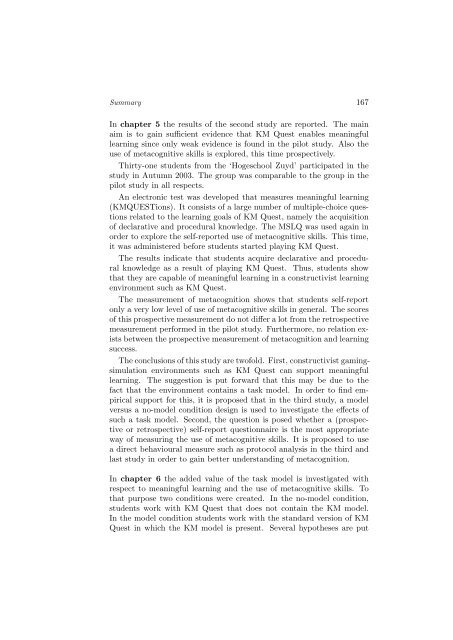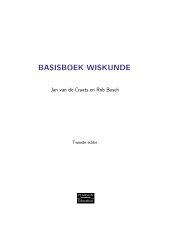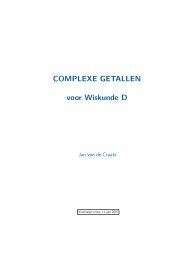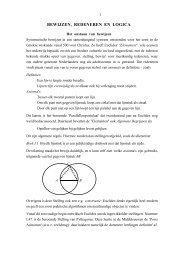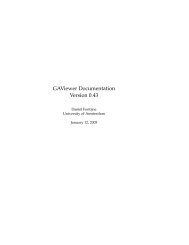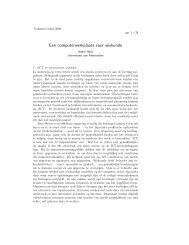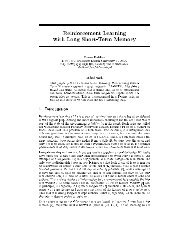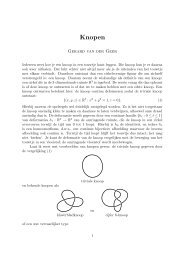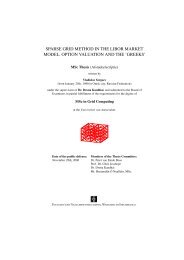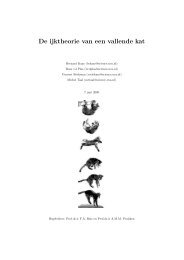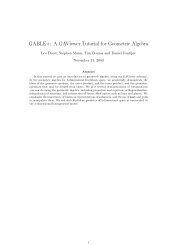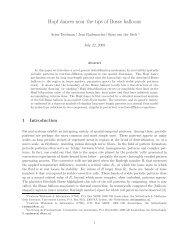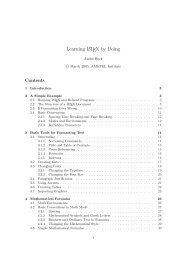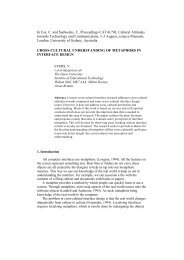The role of metacognitive skills in learning to solve problems
The role of metacognitive skills in learning to solve problems
The role of metacognitive skills in learning to solve problems
You also want an ePaper? Increase the reach of your titles
YUMPU automatically turns print PDFs into web optimized ePapers that Google loves.
Summary 167<br />
In chapter 5 the results <strong>of</strong> the second study are reported. <strong>The</strong> ma<strong>in</strong><br />
aim is <strong>to</strong> ga<strong>in</strong> sufficient evidence that KM Quest enables mean<strong>in</strong>gful<br />
learn<strong>in</strong>g s<strong>in</strong>ce only weak evidence is found <strong>in</strong> the pilot study. Also the<br />
use <strong>of</strong> <strong>metacognitive</strong> <strong>skills</strong> is explored, this time prospectively.<br />
Thirty-one students from the ‘Hogeschool Zuyd’ participated <strong>in</strong> the<br />
study <strong>in</strong> Autumn 2003. <strong>The</strong> group was comparable <strong>to</strong> the group <strong>in</strong> the<br />
pilot study <strong>in</strong> all respects.<br />
An electronic test was developed that measures mean<strong>in</strong>gful learn<strong>in</strong>g<br />
(KMQUESTions). It consists <strong>of</strong> a large number <strong>of</strong> multiple-choice questions<br />
related <strong>to</strong> the learn<strong>in</strong>g goals <strong>of</strong> KM Quest, namely the acquisition<br />
<strong>of</strong> declarative and procedural knowledge. <strong>The</strong> MSLQ was used aga<strong>in</strong> <strong>in</strong><br />
order <strong>to</strong> explore the self-reported use <strong>of</strong> <strong>metacognitive</strong> <strong>skills</strong>. This time,<br />
it was adm<strong>in</strong>istered before students started play<strong>in</strong>g KM Quest.<br />
<strong>The</strong> results <strong>in</strong>dicate that students acquire declarative and procedural<br />
knowledge as a result <strong>of</strong> play<strong>in</strong>g KM Quest. Thus, students show<br />
that they are capable <strong>of</strong> mean<strong>in</strong>gful learn<strong>in</strong>g <strong>in</strong> a constructivist learn<strong>in</strong>g<br />
environment such as KM Quest.<br />
<strong>The</strong> measurement <strong>of</strong> metacognition shows that students self-report<br />
only a very low level <strong>of</strong> use <strong>of</strong> <strong>metacognitive</strong> <strong>skills</strong> <strong>in</strong> general. <strong>The</strong> scores<br />
<strong>of</strong> this prospective measurement do not differ a lot from the retrospective<br />
measurement performed <strong>in</strong> the pilot study. Furthermore, no relation exists<br />
between the prospective measurement <strong>of</strong> metacognition and learn<strong>in</strong>g<br />
success.<br />
<strong>The</strong> conclusions <strong>of</strong> this study are tw<strong>of</strong>old. First, constructivist gam<strong>in</strong>gsimulation<br />
environments such as KM Quest can support mean<strong>in</strong>gful<br />
learn<strong>in</strong>g. <strong>The</strong> suggestion is put forward that this may be due <strong>to</strong> the<br />
fact that the environment conta<strong>in</strong>s a task model. In order <strong>to</strong> f<strong>in</strong>d empirical<br />
support for this, it is proposed that <strong>in</strong> the third study, a model<br />
versus a no-model condition design is used <strong>to</strong> <strong>in</strong>vestigate the effects <strong>of</strong><br />
such a task model. Second, the question is posed whether a (prospective<br />
or retrospective) self-report questionnaire is the most appropriate<br />
way <strong>of</strong> measur<strong>in</strong>g the use <strong>of</strong> <strong>metacognitive</strong> <strong>skills</strong>. It is proposed <strong>to</strong> use<br />
a direct behavioural measure such as pro<strong>to</strong>col analysis <strong>in</strong> the third and<br />
last study <strong>in</strong> order <strong>to</strong> ga<strong>in</strong> better understand<strong>in</strong>g <strong>of</strong> metacognition.<br />
In chapter 6 the added value <strong>of</strong> the task model is <strong>in</strong>vestigated with<br />
respect <strong>to</strong> mean<strong>in</strong>gful learn<strong>in</strong>g and the use <strong>of</strong> <strong>metacognitive</strong> <strong>skills</strong>. To<br />
that purpose two conditions were created. In the no-model condition,<br />
students work with KM Quest that does not conta<strong>in</strong> the KM model.<br />
In the model condition students work with the standard version <strong>of</strong> KM<br />
Quest <strong>in</strong> which the KM model is present. Several hypotheses are put


